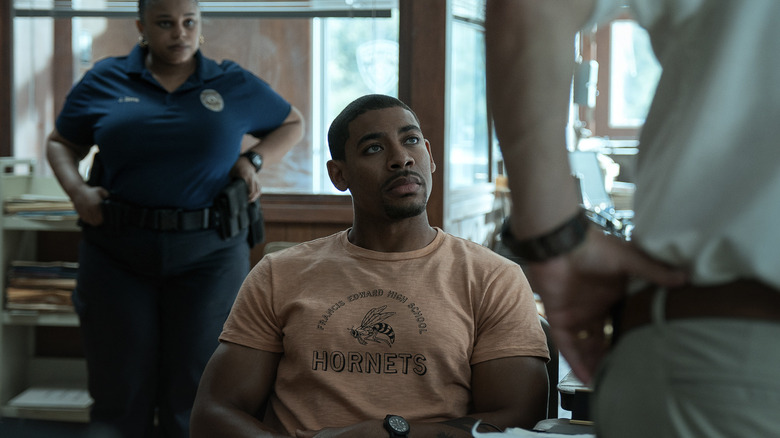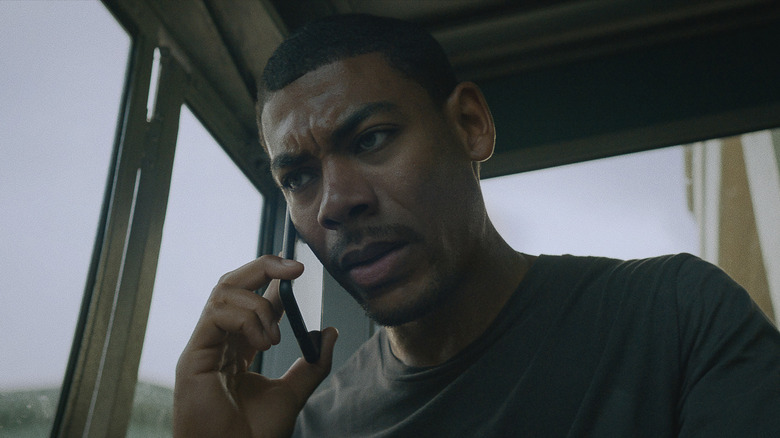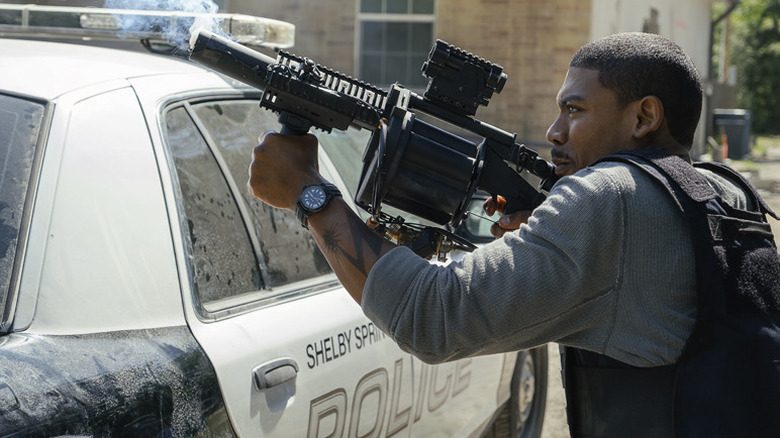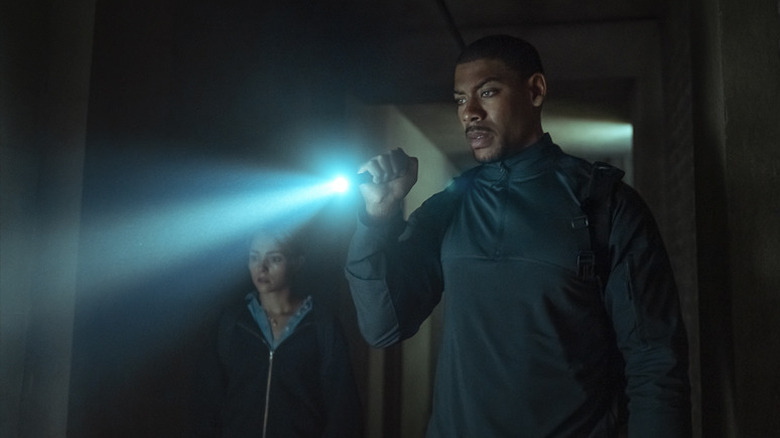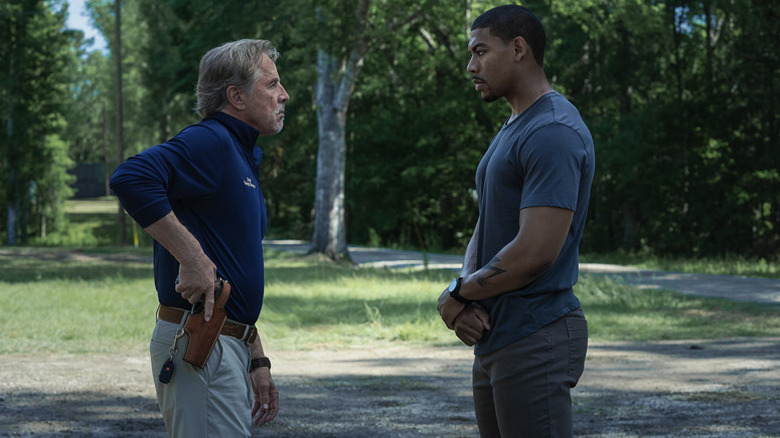Rebel Ridge Director Jeremy Saulnier Explains The Movie's Ending [Exclusive Interview]
This post contains spoilers for "Rebel Ridge."
"Green Room" director Jeremy Saulnier's latest movie, "Rebel Ridge," is currently sitting atop the Netflix charts just a few days after its debut. (I'm personally thrilled about that: Too often, forgettable studio movies end up claiming those top spots while much bolder movies get lost in the algorithm.) "Rebel Ridge" is a stellar action thriller with spectacular performances from Aaron Pierre, Don Johnson, and AnnaSophia Robb, and although it takes some cues from films like "First Blood," Saulnier manages to make it feel distinctly modern.
I caught up with the director recently over Zoom and had a spoiler-filled conversation with him about how much "First Blood" inspired this project (there was nearly a Colonel Trautman joke in "Rebel Ridge," referencing a supporting character in that first Rambo movie), the aspect of the movie Saulnier refers to as "career-defining," and much more. Specifically, I asked him about the ending, which, although I still love the film, I personally think undercuts the movie's strongest message. Did Saulnier change the story to appease Netflix, or were the final moments — in which the cops of Shelby Springs end up coming to Terry's aid after their corrupt leader has been taken down — always how he envisioned this conclusion? Read on to find out.
This interview has been lightly edited for clarity and brevity.
Rebel Ridge director didn't change the script after Aaron Pierre replaced John Boyega
You originally had John Boyega cast as your lead, and he had to leave the project several weeks into filming due to family reasons. You found a phenomenal replacement in Aaron Pierre, and I'm sure you have great things to say about him, but I would love to know what that period of uncertainty was like for you. Because having to recast your lead actor that deep into a production is an unusual challenge for a director.
Absolutely. We certainly faced headwinds on that version of the movie, but honestly, it just ended up for the better. And luckily, I actually cast Aaron within weeks, so we conspired, got on a Zoom together, and fell in love. He loved the project and was willing to take that leap with me. I got on the Zoom with him and knew within two minutes, "Oh s***, this is the guy. This is our guy." And out of respect to all involved, I won't get into the whole departure, but it was necessary. And actually, there was no ill will. It was just like oof — after the Covid shutdown, we had to shut down again. But it truly was the only version of this film I could ever realize. I saw Aaron on that Zoom, and then a year later saw him on set and knew that I had f***ing struck gold.
He was awesome in the movie. Were there any tweaks that you made to the script once you started working with Aaron and saw his strengths as an actor and what he was bringing to the character.
No, and that's a testament to Aaron. The character was always the character, and because it did get protracted over a three-year period, I had to give myself space and I did not go and tweak and tinker. I trust my gut as a filmmaker and wanted to, when I lit that fuse in 2018 and started writing it, I wanted to let that explode as it would've. To make that happen, I had to sneak away and start another script and divert myself from — I think a filmmaker can be their own worst enemy, right? So I didn't want to tinker. I had to preserve the energy and I didn't even read the script for a full year. I just said, "I know this thing, I love this thing, and to hold onto that, let me keep it fresh." So I would come on set, I would be researched. I know the scenes that we were doing, and I'd dig in and I know the architecture. I'd give them guidance, all the actors, but I never read it start to finish since I finished the production draft in 2020.
The movie's ending was not the result of a Netflix note
As audience members, I think we've been trained by action movies to think that the Terry character is going to go ballistic on these cops at the end of the movie and start killing people left and right, and he takes the non-lethal approach instead. I was wondering if you could talk about why that decision was important for you.
I do most of my decision-making based on pragmatism, plausibility, and the narrative needs I need as a filmmaker. Like how do I engineer this to work? And without going too in-depth [into] the finale, it was new for me to not just murder everyone in my movie. [laughs] Using violence, giving people a legitimate cinematic payoff and a setpiece that can resonate with them, but trying something new for me and keeping it in character. I think Terry is too much of a sort of pragmatist. He's a gentleman. Now he certainly reaches a boiling point and explodes. There's always that sort of inner truth for him, and it unfolded as it had to and I embraced it and used it as a whole subversion of what you might expect. Especially from me. [laughs]
Yeah, definitely. I do want to ask you one more thing about the ending, and I'm going to put this behind a spoiler warning, so hopefully people have seen it at this point. I have to admit that I was surprised by the way that the movie, which spends a huge chunk of its narrative talking about the corrupt nature of the police, has several officers ride in to help sort of save the day at the end. Was that always something you envisioned for the ending of this story? Was that a Netflix note? How did that come about?
No, I mean, it's just how I engineered the ending. And also, on a second or a third watch, I think it's very clear that the people who are part of these corrupt systems are led by a few and often don't fully believe in the system that they are sort of perpetuating. And they can find ways to disavow their own role, they can find ways to make sense — "Oh, you know, I'm bringing food, putting it on the table to the family" — whatever they do to convince themselves. But if you look across the battlefield in the finale, there's a lot of just humans there and they're confused, and sometimes people are pushed too far and I just tried to infuse a level of plausibility and reality. But it's lot to ask in a film these days where a cop can be portrayed as a human who has a limit and wants to uphold the law.
Jeremy Saulnier found joy editing Rebel Ridge
There's also this really wonderful feeling that I'm having trouble articulating, but especially as the characters go down into the catacombs, I got the sense as a viewer of almost watching something novelistic. It just felt like this classic story that's always existed. I don't know if that is something that you're going for as a writer, or if you know what I'm even talking about when I say it almost feels literary in a way. So can you just talk me through if that was a purposeful choice, or if that kind of cerebral nonsense is even something you're thinking about when you're writing a movie?
I don't. I don't think about it. I just try to stay true. But I'll take that, though. I'll take that. There is a lot of dialogue and I wanted to complement that dialogue with sort of setpieces. And so that catacomb sequence is a very visual, sort of flashlight-lit, exploration. And of course there's themes here. I mean, the basement there of the courthouse, that's the old Confederate courthouse and the history there, and as we scouted locations, that's something I became familiar with, is these old courthouses and the history there. It gives you pause, and there's a certain amount of reverence in those. That's actually probably the most, as far as an actual theme that resonates, we touch on that and that was sensitive to everyone involved on set.
But as far as the literary nature of it all, I definitely had fun with dialogue and I used it to not just hear my words spoken on set. I f***ing hate dialogue. So I was surprised, but it was natural to the environment. I mean, Terry is a fish out of water. He's struggling, he's trying to abide by the rules, stay on the rails, and find out what the f*** is happening to him, and he has to interface verbally. So all these dialogue scenes I think are warranted. But I wanted to supercharge the dialogue.
So in some scenes, I think there's catharsis and there's these exploding moments of rage and action, but what's surprising is how much fun I had and how much I got as a viewer out of just dialogue scenes where there's some witty back and forths or just some tension that's mounting and to deprive the audience of information and have them sort of be witness to this pressure cooker. It's really a lot of fun.
Yeah, it's fantastic. One thing that I've heard filmmakers say is that they "find the movie" while editing it, and as they're putting it together, the movie kind of tells them what shape it wants to take and what it wants be. This is your first time being credited as an editor on a movie, so I was wondering what you learned about the movie during the editing process that maybe you didn't anticipate in earlier stages of making it.
That's certainly fun. I, as the writer, director, editor, I mean, I certainly had a plan, and this is a bigger footprint for me as far as the production, the size, the cameras, we had lots of cameras rolling and wanted to get it right, but I, as an editor, just fell back to my original intention, that of my collaborators, my cinematographer. I actually took great pains to infuse simplicity in the edit and make it seem, as it was, very designed and to ignore B and C camera if I had it. They're there for insurance, they're great operators, we're all doing great work, but for shot design and sequencing, there had to be a reason for every single camera move, for every choice in the edit room, and that was very important.
Now, finding the alchemy is more technical for me. It's very mathematical. So again, I know intimately all the lines and the beats, and we shot it, right? So I'm not reinterpreting it or finding it, but I am allowing myself to be surprised, and the process — you've got to pick the second best take that goes with this take, and all of a sudden the alchemy is that's the best version. But having that, after so much tumult of production — I mean, when you're out there in Louisiana and it's 128 degrees with the heat index and you're sitting there with gorgeous raking sunlight, but you can't shoot because five miles away there's a lightning storm, it's unnerving. But you're facing the elements. You have no control.
In the edit room, you do have control and I found joy there. I found, as a filmmaker, when you find things that work or you create something that didn't fully exist on set and you're giving your actors the best possible platform and you're protecting your crew and yourself by only using the very best — it could be take two or take 12, but I would sometimes be alone above my garage editing with my Avid system and just vocally just hooting and hollering joy about finding these moments. When Don Johnson just nails that line, it is the best part of the process now for me.
Rebel Ridge director says casting Aaron Pierre is a career-defining moment
How influential was "First Blood" on "Rebel Ridge"? Was that a specific inspiration for you when writing this?
So, it became one. Most of my inspirations I deny initially because I wanted this to be its own thing, but once I realized by setting up the premise that it was going to be a guy against a small town police force, of course it's "First Blood." I almost added a Colonel Trautman joke into one scene, actually. It's not a pet peeve of mine, but when films are overly sort of referential or self-referential, it kind of bugs me. I like films to be real stories I can get enthralled with and just taken on a journey. So I was disciplined about that and "First Blood" became more of a craft-level inspiration. I mean, just the sequences — when Stallone gets on that motorbike and just goes up into the Northwest mountains and just the dirt, the smoke from the exhaust, the anamorphic cinematography, that was certainly a huge influence, as were many other movies.
I also was looking at "Michael Clayton" and some other films that had a tactile, grounded craft to them. I think the ending of "Thunderheart" came to mind. [Cinematographer Roger] Deakins shot that years and years ago. But there's this amazing sequence where a bunch of FBI Plymouth K-cars are just driving full speed across a dirt tundra and kicking up dust, and I miss that. You don't feel the artificiality and the green screens. You feel just like this simplicity. I mentioned "Beverly Hills Cop," the opening of that movie is a big f***ing truck smashing stuff, and I get more excitement out of that because I know it's real. It's happening. It's amazing. You feel the impact [more than] a lot of just contrived stuff that's not in my wheelhouse. So I wanted to embrace those older films, textually, mostly.
Absolutely. All right, so I have one more minute with you. When you think back on your experience of making this movie, what's the thing that you're most proud of?
Oh, just fortitude. Just sticking with it. Me finding Aaron Pierre for all these twists and turns is, I think, a career-defining moment in both of our journeys. And I love him like a brother. I'm so proud of him. I've said this many times and it's true: He's my first movie hero role. I don't write competent protagonists, and he was that. He was a hero on-screen and off, he kind of saved the day for me, and he overachieved, and I cannot wait to see this guy fly. He's going to be — I think he's the next big thing. And I had a small part in just witnessing that journey. So I'm thrilled.
I hope to see you guys work again together soon.
Oh, we will.
"Rebel Ridge" is now streaming on Netflix.
